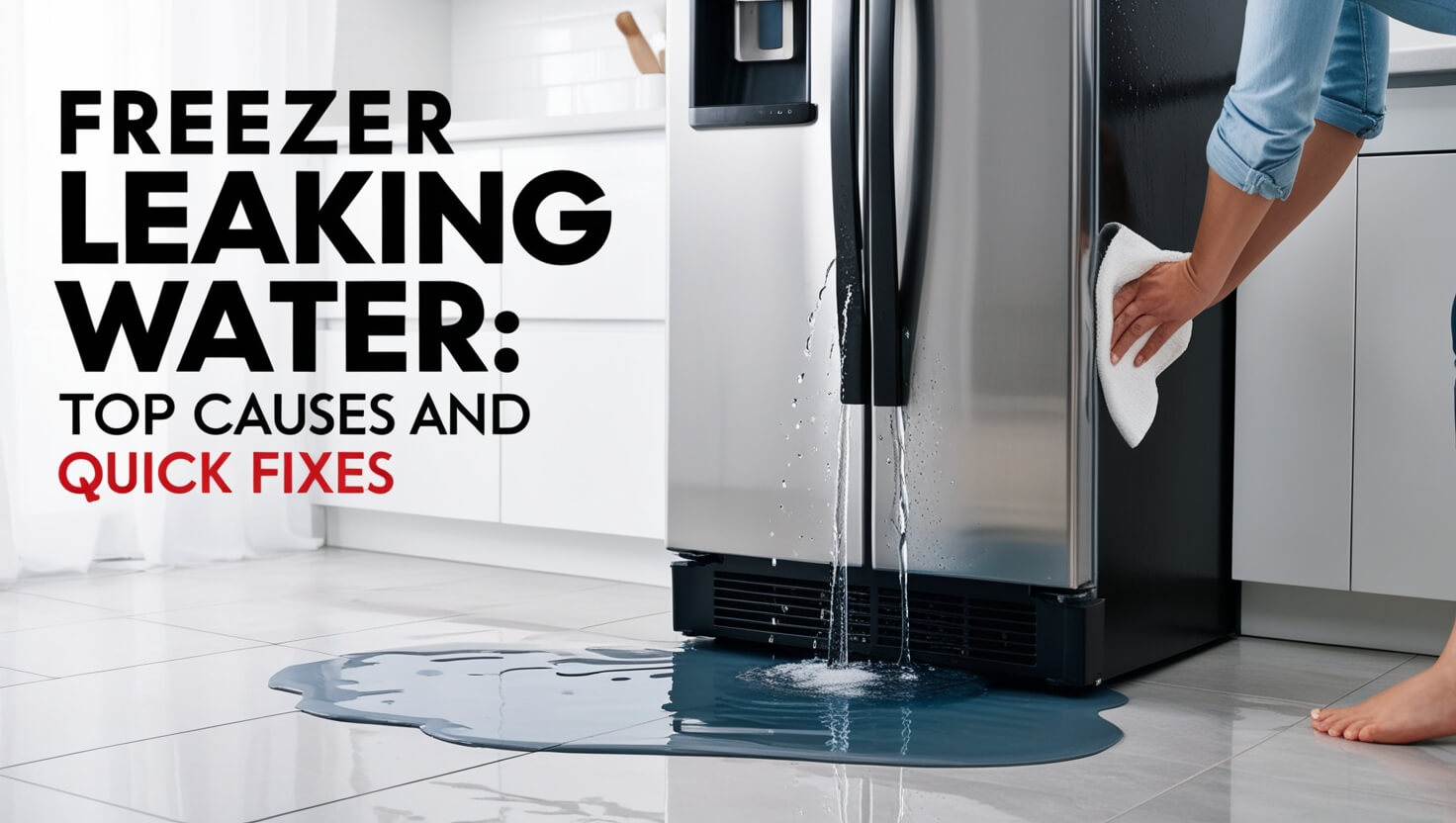
Have you ever walked into your kitchen to find a puddle of water around your freezer? A freezer leaking water is a common household problem that can lead to serious issues if left unchecked. In this comprehensive guide, we’ll explore the reasons behind freezer leaks, how to fix them, and ways to prevent future problems.
Common Signs of a Leaking Freezer
Freezer leaks can be frustrating and potentially damaging to your home. Before we dive into the causes and solutions, let’s look at some telltale signs that your freezer might be leaking.
- Water pooling on the floor around the appliance
- Frost buildup inside the freezer compartment
- Ice crystals forming on frozen food packages
- Unusual noises coming from the freezer
- Increased energy bills
If you’ve noticed any of these signs, it’s time to investigate the source of the leak.
Why Addressing Freezer Leaks is Important
Ignoring a leaking freezer can lead to:
- Water damage to your flooring
- Mold and mildew growth
- Increased energy consumption
- Spoiled food
- Potential electrical hazards
Tackling the problem early can save you money and headaches down the road.
Top 6 Causes of Freezer Water Leaks
Let’s explore the most common reasons why your freezer might be leaking water.
1. Clogged or Frozen Defrost Drain
A clogged or frozen defrost drain is often the culprit behind freezer leaks. During the defrost cycle, water should flow down the drain and into a pan beneath the freezer. If the drain is blocked, water can overflow and leak onto your floor.
2. Damaged or Cracked Drain Pan
The drain pan catches water from the defrost process. If it’s cracked or damaged, water will leak directly onto your floor. Over time, these pans can wear out or become brittle, especially in older freezers.
3. Improper Door Seal
A faulty door gasket can let warm, humid air into your freezer. This leads to excess condensation, which can turn into water leaks. Check your freezer’s seal regularly to ensure it’s making proper contact all the way around.
4. Incorrect Temperature Settings
If your freezer’s temperature is set too high, it can cause ice to melt and refreeze, leading to water leaks. The ideal freezer temperature is 0°F (-18°C).
5. Improper Food Storage
Overloading your freezer or storing items improperly can block air vents and lead to poor circulation. This can cause uneven cooling and excess condensation, resulting in water leaks.
6. Ice Maker Issues
If your freezer has an ice maker, problems with the water line or the ice maker itself can cause leaks. Loose connections or a damaged water inlet valve are common culprits.
How to Diagnose a Leaking Freezer
Before you can fix the problem, you need to identify its source. Here’s a step-by-step guide to help you diagnose your leaking freezer.
Step-by-Step Troubleshooting Guide
- Unplug the freezer for safety
- Remove all food items and store them in a cooler
- Check the drain pan for cracks or overflow
- Inspect the door seal for damage or gaps
- Look for ice buildup around the evaporator coils
- Examine the defrost drain for clogs
- Check the ice maker and water line connections
When to Call a Professional
While many freezer leaks can be fixed at home, some issues require expert attention. Call a professional if:
- You’re uncomfortable working with electrical appliances
- The leak persists after trying DIY solutions
- You suspect a problem with the compressor or cooling system
- Your freezer is still under warranty
DIY Solutions for Freezer Water Leaks
Now that we’ve identified potential causes, let’s look at some do-it-yourself fixes for common freezer leaks.
Clearing a Clogged Defrost Drain
To unclog a frozen drain:
- Use a turkey baster to flush the drain with warm water
- Insert a pipe cleaner or soft brush to remove debris
- Pour a mixture of bleach and water down the drain to prevent future clogs
Replacing a Damaged Drain Pan
If your drain pan is cracked:
- Locate the pan under your freezer
- Carefully remove it and check for damage
- Replace with a new pan designed for your freezer model
Fixing or Replacing Door Seals
To address door seal issues:
- Clean the gasket with warm, soapy water
- Check for gaps by closing the door on a dollar bill
- Replace the seal if cleaning doesn’t solve the problem
Adjusting Freezer Temperature
To set the correct temperature:
- Use a freezer thermometer to check the current temperature
- Adjust the thermostat as needed
- Wait 24 hours and recheck to ensure stability
Proper Food Storage Techniques
To prevent overloading and air blockages:
- Leave space between items for air circulation
- Don’t block air vents with food packages
- Use airtight containers to reduce moisture
Addressing Ice Maker Problems
For ice maker leaks:
- Check the water line for kinks or damage
- Tighten any loose connections
- Replace the water inlet valve if necessary
Preventing Future Freezer Leaks
An ounce of prevention is worth a pound of cure. Here are some tips to keep your freezer running smoothly and leak-free.
Regular Maintenance Tips
- Clean the interior and exterior regularly
- Defrost manual freezers when ice buildup exceeds 1/4 inch
- Check and clean the condenser coils twice a year
- Inspect the door seal monthly for wear and tear
Best Practices for Freezer Use
- Don’t overload your freezer
- Allow hot foods to cool before freezing
- Open the door only when necessary
- Keep your freezer at least 2/3 full for optimal efficiency
When to Replace Your Freezer
Sometimes, despite your best efforts, it’s time to say goodbye to your old freezer. Here’s how to know when it’s time for an upgrade.
Signs It’s Time for a New Appliance
- Your freezer is over 10 years old
- Repairs cost more than half the price of a new model
- Energy bills are consistently high
- The freezer can’t maintain a stable temperature
Choosing an Energy-Efficient Freezer
When shopping for a new freezer:
- Look for ENERGY STAR certified models
- Consider the appropriate size for your needs
- Compare annual energy consumption estimates
- Read user reviews for reliability information
Frequently Asked Questions About Freezer Leaks
Let’s address some common questions about freezer leaks:
How often should I defrost my freezer?
For manual defrost freezers, defrost when ice buildup reaches 1/4 inch. Self-defrosting models don’t require manual defrosting.
Can a leaking freezer be dangerous?
Yes, water leaks can create slip hazards and potentially lead to electrical problems if not addressed promptly.
How long should a freezer last?
With proper maintenance, a freezer can last 10-20 years.
Is it normal for my freezer to make noise?
Some noise is normal, but loud or unusual sounds may indicate a problem.
Can I use a hairdryer to defrost my freezer?
It’s not recommended due to the risk of electrical shock. Use warm water or a fan instead.
Conclusion
A freezer leaking water can be a hassle, but with the right knowledge and tools, you can often solve the problem yourself. Regular maintenance, proper use, and prompt attention to small issues can prevent major leaks and extend the life of your appliance. By following the tips in this guide, you’ll be well-equipped to handle freezer leaks and keep your kitchen dry and your food safely frozen.
Remember, if you’re ever in doubt about a repair or if the problem persists, don’t hesitate to call a professional. Your safety and the longevity of your appliance are worth the investment. Here’s to a leak-free freezer and peace of mind in your kitchen!






